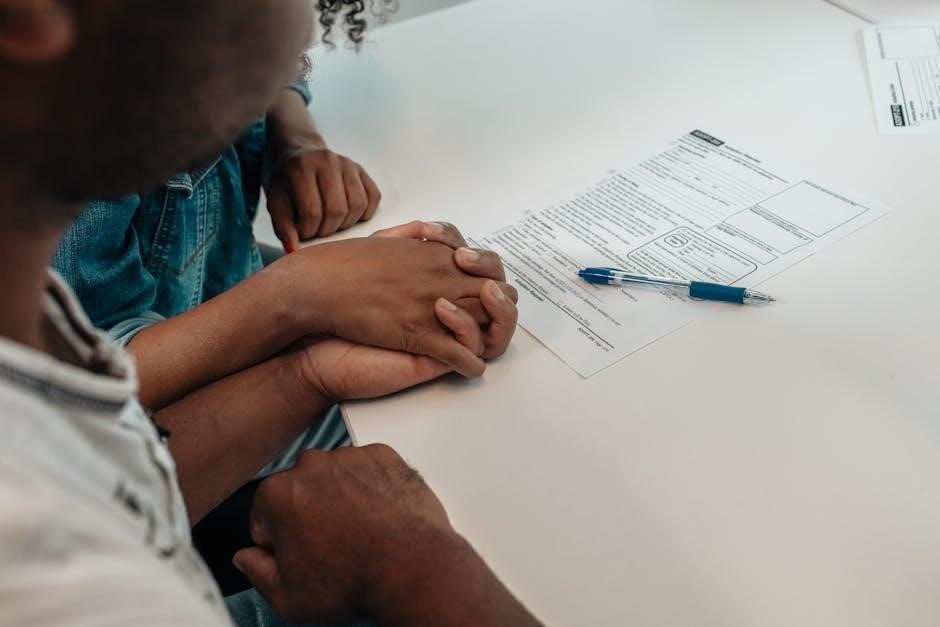
nj marriage license application form
The marriage license application form is essential for couples planning to wed in New Jersey. It is available online or at local registrars’ offices.
The form requires detailed personal information and documentation to ensure accuracy. Once submitted, a 72-hour waiting period applies before the license is issued.
Overview of the Marriage License Application Process in New Jersey
The marriage license application process in New Jersey involves several steps to ensure compliance with state laws. Couples must complete the application form, which can be obtained online or at a local registrar’s office. The form requires detailed personal information, and applicants must submit necessary documentation, such as proof of identity and age. Once the application is completed, it must be submitted to the appropriate municipality, either in person, by email, or via drop-off. A 72-hour waiting period follows submission before the license is issued. The process is designed to streamline the application while adhering to legal requirements.
Importance of Completing the Application Form Accurately
Accurately completing the marriage license application form is crucial to avoid delays or rejection. Any errors or omissions can lead to processing issues or legal complications. The form requires precise personal and documentary information, ensuring all details align with official records. Inaccuracies, such as incorrect names or dates, can result in the license being deemed invalid. Additionally, the form must be filled out correctly before submission, as signing it prematurely may cause further complications. Ensuring accuracy guarantees a smooth process and compliance with New Jersey’s legal requirements, making the application valid and legally recognized within the state.
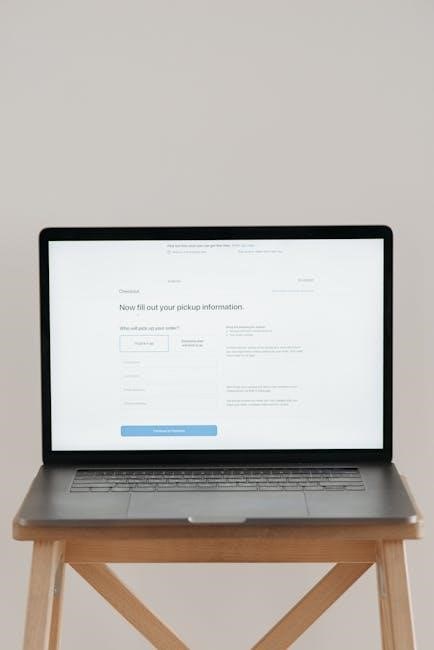
Eligibility Criteria for Applying
Applicants must meet specific criteria, including age requirements, mental capacity, and legal status. Both parties must consent freely, and certain familial relationships are prohibited by law.
Age Requirements for Applicants
Applicants must be at least 18 years old to marry in New Jersey without parental consent. Minors under 18 are prohibited from marrying unless they are 16 or 17 and obtain written parental or guardian consent. For applicants under 16, marriage is only permitted with judicial approval. The law ensures that all parties have the legal capacity to consent to marriage. Proper identification verifying age is required when submitting the application. These age requirements are strictly enforced to protect the rights and well-being of all individuals involved in the marriage process.
Residency Requirements for New Jersey Applicants
Residency determines where applicants must file their marriage license application in New Jersey. If both applicants are state residents, they must apply in the municipality where at least one of them resides. For non-residents, the application must be submitted in the town where the marriage ceremony will take place. This ensures the license is issued in the correct jurisdiction. The license is valid throughout New Jersey once issued. Applicants must provide proof of residency, such as a driver’s license or utility bill, when submitting their application. Adhering to these residency guidelines is essential to avoid delays in the process.
Documentation Needed for Non-Residents
Non-residents applying for a marriage license in New Jersey must provide specific documents. Both applicants need valid identification, such as a driver’s license, passport, or state ID. They must also submit proof of age, typically through a birth certificate or passport. If divorced, a finalized divorce decree or annulment papers are required. Non-residents must apply in the municipality where the ceremony will occur. Additional documentation may include a Social Security card or visa for non-citizens. It is crucial to verify all documents are current and valid to ensure a smooth application process. Failure to provide necessary paperwork may delay license issuance. Proper documentation ensures compliance with state regulations.
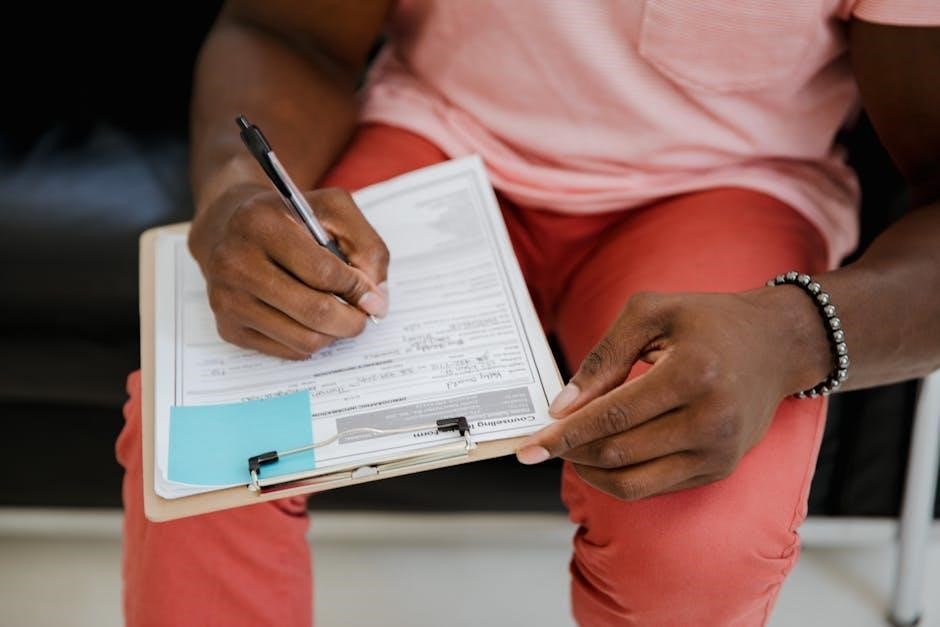
Step-by-Step Application Process
The process involves obtaining the form, completing it online or in-person, submitting required documents, and paying the fee. A 72-hour waiting period follows before the license is issued.
Obtaining the Marriage License Application Form
Couples can obtain the marriage license application form online from the New Jersey Department of Health website or in person at their local registrar’s office; The form is also available at municipal buildings. Applicants must ensure they download or pick up the most recent version, as outdated forms may delay processing. It is important not to sign the application until instructed by the registrar. The form requires detailed personal information, including names, addresses, and birth details. Applicants should review the form carefully and gather all necessary documents before submission to avoid delays in the process.
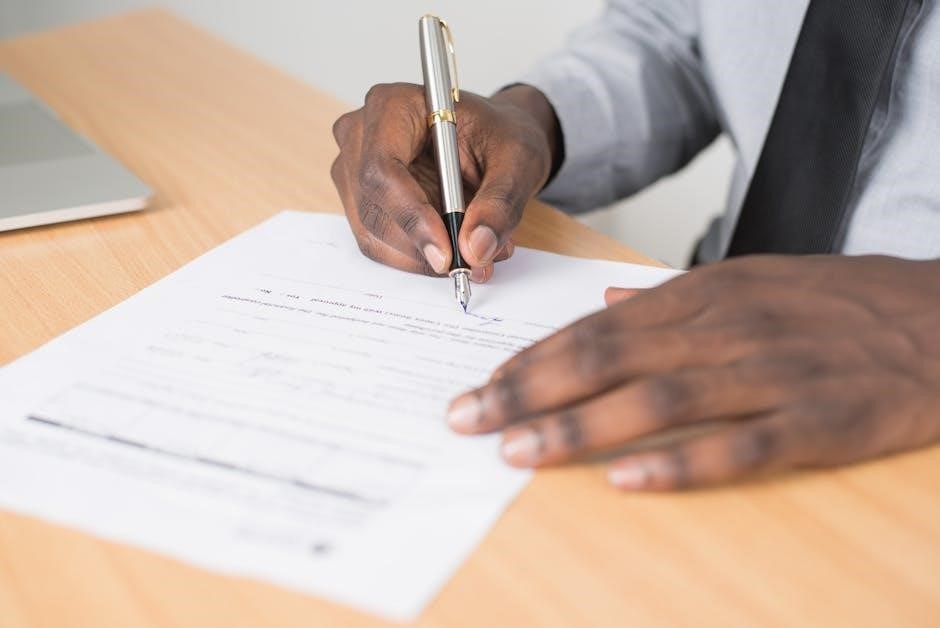
Completing the Application Form Online or In-Person
The marriage license application form can be completed online via the New Jersey Department of Health website or in person at the local registrar’s office. Online applicants can fill out the form, print it, and bring it to the registrar unsigned. In-person applicants must visit the office with proper identification and documentation. Both methods require accurate and complete information to avoid processing delays. The form includes sections for personal details, residency, and previous marriages, if applicable. Applicants are advised to review the form carefully before submitting it to ensure all information is correct and up-to-date. This step is critical for a smooth application process.
Required Documents for Submission
Applicants must provide specific documents when submitting the marriage license application form. These include a valid birth certificate, passport, or other government-issued ID. Proof of residency, such as a driver’s license or utility bill, is also required. If either applicant has been previously married, a divorce decree or death certificate must be submitted. Both applicants must appear in person and provide Social Security numbers. All documents should be original or certified copies. Ensuring all required paperwork is complete and accurate helps avoid delays in processing the application. These documents are essential for verifying eligibility and finalizing the marriage license.
Submission Methods: Email, In-Person, or Drop-Off
Couples can submit their completed marriage license application form via email, in-person, or by drop-off. Email submissions are accepted by local registrars, while in-person submissions allow for immediate processing. Drop-off options are available for those unable to meet in person. Regardless of the method, applications must not be signed before submission. Ensure all required documents are included to avoid delays. Contact local registrars for specific instructions, as submission policies may vary. This flexibility ensures convenience for applicants while adhering to New Jersey’s marriage license regulations.
Paying the Application Fee
The application fee for a marriage license in New Jersey is typically $28, which is non-refundable. Payment methods vary by municipality but may include cash, check, money order, or credit cards. Applicants should verify acceptable payment options with their local registrar beforehand. The fee covers the cost of processing the application and issuing the license. It is important to note that the fee is non-refundable, even if the application is withdrawn or denied. Ensure payment is made prior to submitting the application to avoid delays in processing. Contact the local registrar for specific payment instructions, as policies may differ across municipalities.
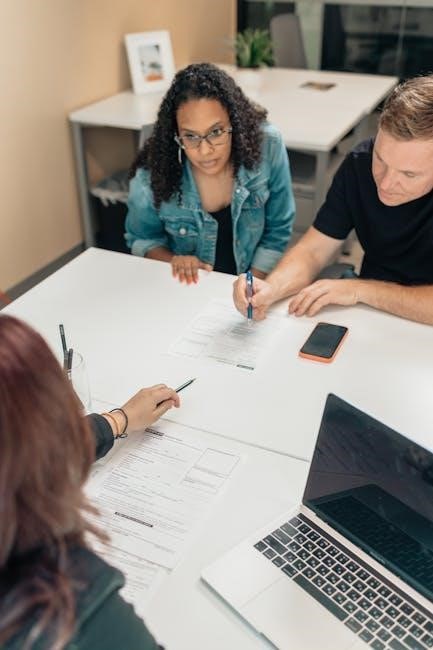
Waiting Period and License Issuance
The license is issued after the mandatory 72-hour waiting period. It is valid throughout New Jersey and does not expire, allowing flexibility for the ceremony date.
Understanding the 72-Hour Waiting Period
The 72-hour waiting period begins once the marriage license application is processed. Couples must wait this timeframe before the license is issued. The license is valid statewide and does not expire. It’s important to note that applicants should not sign the application before submitting it to the registrar. This waiting period ensures proper processing and verification of documents. For non-residents, the application must be submitted in the municipality where the ceremony will occur. This period is mandatory and cannot be waived, so couples should plan accordingly to avoid delays in their wedding plans.
When the License is Issued
Once the 72-hour waiting period is completed, the marriage license is issued. The license is valid throughout New Jersey and does not expire. Couples can use it to have their ceremony anywhere in the state. After issuance, the license must be signed by the officiant and witnesses, then returned to the registrar for recording. It’s important to ensure all information is accurate before submission. The license is a critical document for legal marriage recognition. Applicants should verify all details before the ceremony to avoid delays. The registrar ensures proper processing and maintains a record of the marriage.
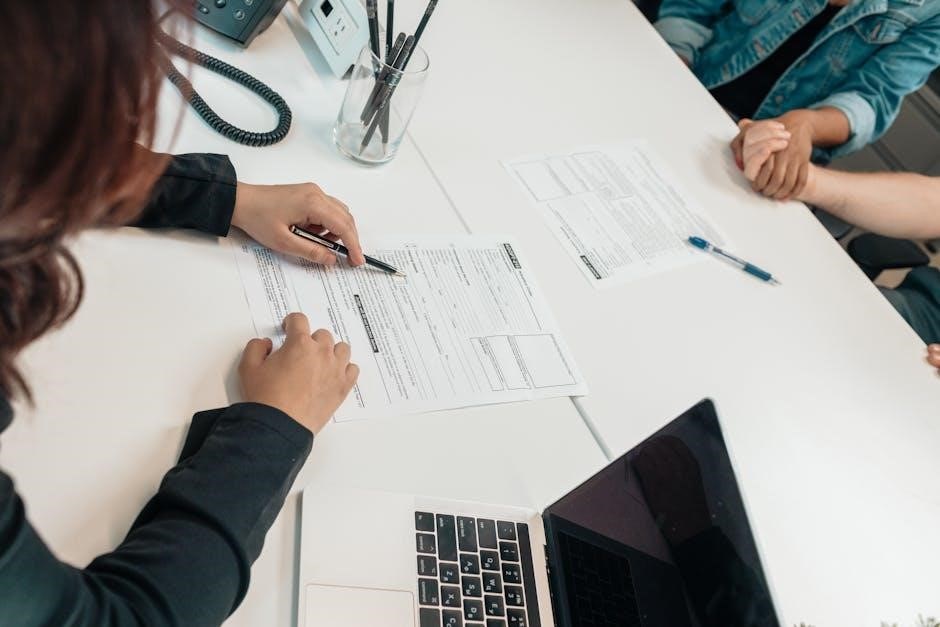
Special Cases and Additional Requirements
Special cases may include same-sex marriages, third gender options, or remarriages. New Jersey law ensures inclusive application processes, requiring proper documentation for non-residents and specific ceremonies.
Remarriage or Reaffirmation of Civil Union
For individuals seeking remarriage or reaffirmation of a civil union, specific requirements apply. A completed marriage license application form must be submitted, along with documentation such as divorce or civil union dissolution papers. The 72-hour waiting period still applies, and the application process mirrors that of a first-time marriage. Non-residents must apply in the municipality where the ceremony will occur. Recent updates ensure inclusivity, with options for third gender identification. Proper documentation and compliance with New Jersey law are essential for a smooth process. The license remains valid statewide, ensuring flexibility for couples planning their ceremony.
Same-Sex Marriage Applications
New Jersey fully recognizes same-sex marriages, and the application process is identical to heterosexual unions. Couples must complete the marriage license application form, providing required documents like proof of identity and residency. The state mandates equal treatment, ensuring no discrimination based on sexual orientation. Recent updates to the application form include third gender options, promoting inclusivity. Same-sex couples must adhere to the same guidelines, including the 72-hour waiting period and submission of necessary paperwork. Local registrars are responsible for processing applications, and the license is valid statewide. New Jersey’s commitment to equality ensures a seamless process for all couples, regardless of orientation.
Third Gender Option on the Application Form
New Jersey’s marriage license application form now includes a third gender option, ensuring inclusivity for nonbinary individuals. This update, implemented in 2019, reflects the state’s commitment to equality and legal compliance. The option appears on the application form, allowing applicants to select a gender identifier beyond male or female. This change addresses previous inconsistencies in municipal forms, which were corrected to align with state law. The inclusion of the third gender option signifies progress in recognizing diverse identities and ensures that all individuals can accurately represent themselves on official documents. This adjustment is part of New Jersey’s broader efforts to promote inclusivity and equality in legal processes.
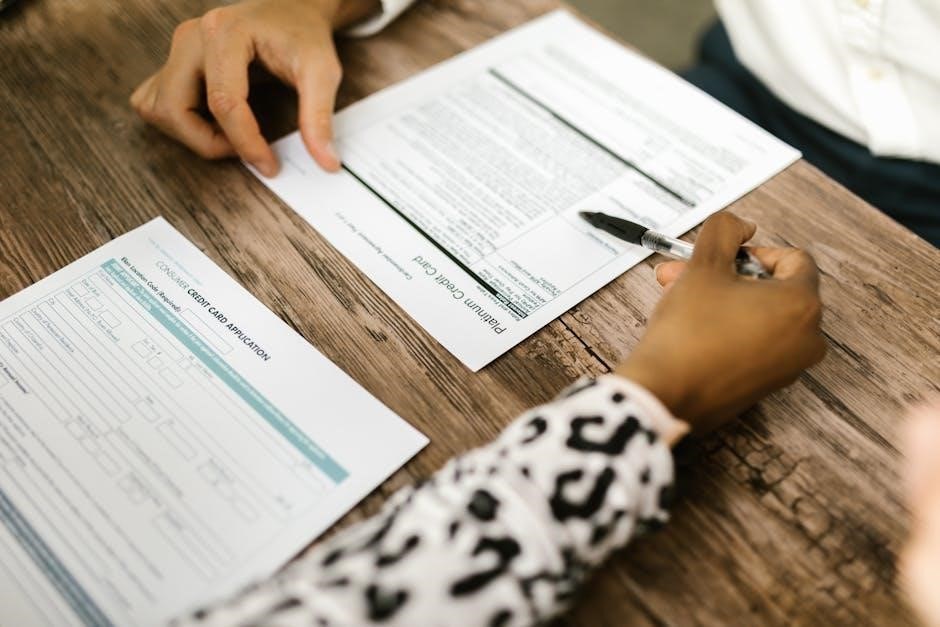
Legal and Procedural Requirements
The marriage license application must not be signed before submission. This ensures authenticity when processed by the local registrar.
Applicants must meet all legal standards, providing accurate information and necessary documentation to avoid delays.
Significance of Not Signing the Application Before Submission
Not signing the marriage license application before submission is crucial to ensure its authenticity. The registrar must witness the signatures to verify the applicants’ identities and confirm their consent.
This step prevents fraud and ensures the document is legally binding. Signing beforehand could lead to rejection or delays in processing.
The requirement aligns with New Jersey’s legal procedures, ensuring the application is valid and properly executed. It is a critical step to avoid complications.
Role of the Registrar in Processing Applications
The Registrar plays a pivotal role in processing marriage license applications in New Jersey. They review the application for completeness and accuracy, ensuring all documents are valid.
The Registrar verifies identities, checks for any legal impediments, and confirms compliance with state laws. Once approved, they issue the license after the mandatory waiting period.
The Registrar also maintains records of all marriage licenses, ensuring proper documentation for legal and administrative purposes. Their oversight guarantees the process is efficient and legally sound.

Application Validity and Usage
The marriage license is valid throughout New Jersey and must be used within 30 days of issuance. It cannot be used outside the state.
Where the License is Valid in New Jersey
The marriage license issued in New Jersey is valid throughout the entire state. Couples can use it in any city or town within the state’s jurisdiction.
If both applicants are non-residents, the license must be applied for in the municipality where the ceremony will take place. This ensures compliance with local regulations.
The license is not valid outside of New Jersey and must be used within 30 days of issuance. Proper documentation and adherence to state guidelines are essential for its validity.
Timeframe for Using the License
The marriage license in New Jersey is valid for 30 days from the date of issuance. Couples must use it within this period.
A mandatory 72-hour waiting period applies after the license is issued, meaning the ceremony cannot take place until this time has elapsed.
Applications should be submitted no more than 30 days before the planned ceremony to ensure timely processing and compliance with state regulations.
Proper planning is essential to avoid delays and ensure the license is valid when the wedding takes place.

Recent Updates and Changes
New Jersey has updated its marriage license application forms to include third gender options and ensure compliance with anti-discrimination laws. Municipalities have corrected inconsistent forms.
Inclusion of Third Gender Options
New Jersey has made significant strides in inclusivity by adding third gender options to the marriage license application form. This change, implemented in 2019, allows individuals to select gender identities beyond male or female. The inclusion of this option aligns with the state’s commitment to equality and reflects its progressive stance on LGBTQ+ rights. Municipalities were required to update their forms to match the state’s standardized version, ensuring consistency and compliance with anti-discrimination laws. This update has been particularly impactful for nonbinary and gender-nonconforming individuals, who now have a more inclusive and accurate way to identify themselves on official documents.
Compliance with New Jersey Law
Compliance with New Jersey law is critical when completing the marriage license application form. The state mandates that all forms must include third gender options to ensure equality for all applicants. Municipalities are required to update their forms to reflect these changes, avoiding any exclusionary language. The New Jersey Department of Health has standardized the application process, ensuring that all local registrars adhere to state regulations. This compliance not only upholds legal standards but also promotes inclusivity and respect for all couples. Failure to comply can result in violations, emphasizing the importance of following state guidelines accurately.

Where to Apply
Couples can apply for a marriage license at the Municipal Building or via email. The application form is also available online for submission to local registrars.
Municipal Building Locations
Municipal buildings serve as the primary locations for processing marriage license applications in New Jersey. Each municipality has its own office where couples can submit their forms and required documents.
Applicants can visit the Municipal Building in their local township or borough to complete the process. For non-residents, the application must be made in the municipality where the ceremony will take place.
Contact information for local registrars is typically available on the municipality’s website or by phone. It is advisable to confirm office hours and specific requirements before visiting.
Contact Information for Local Registrars
Contacting local registrars is crucial for a smooth marriage license application process in New Jersey. Each municipality provides specific contact details for their registrar’s office.
Applicants can find this information on the official website of their local town or borough. Phone numbers and email addresses are typically listed for inquiries and document submissions.
It is recommended to verify office hours and any specific requirements directly with the registrar before visiting or submitting the application to ensure compliance with local regulations.